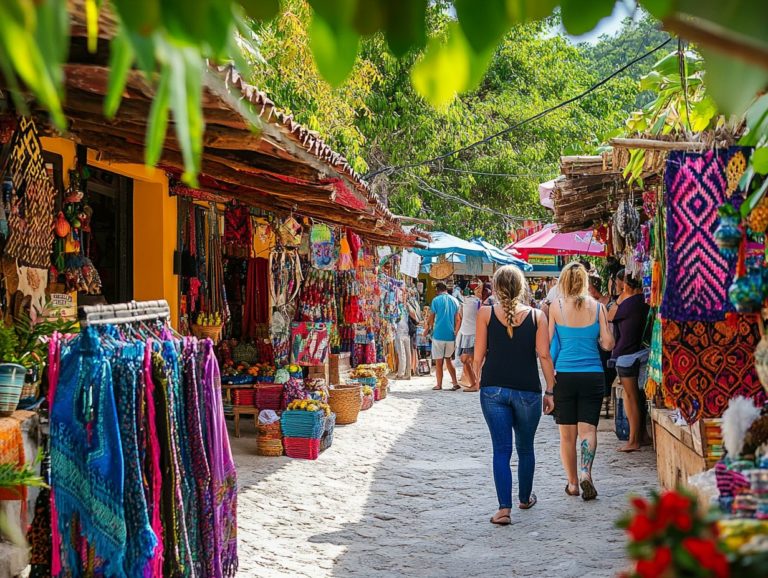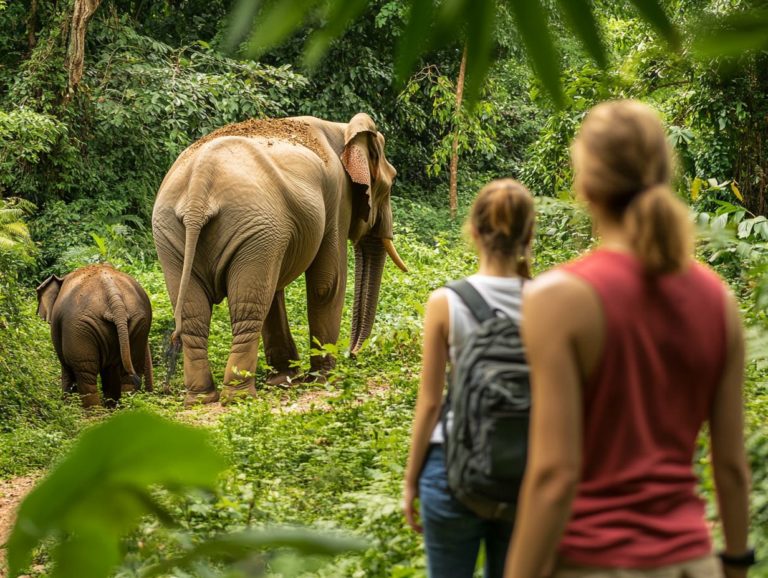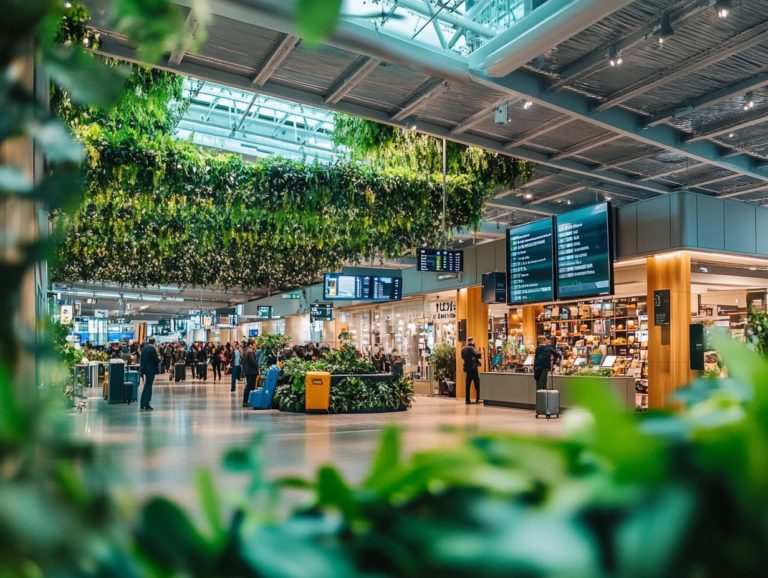5 Ways to Volunteer Responsibly While Traveling
Volunteering while traveling can truly transform your experience. It s crucial to approach it with thoughtfulness and respect.
This article delves into five essential ways to ensure your volunteer efforts are both responsible and impactful. From thoroughly researching the organization to understanding local customs, each step you take can significantly enhance your contribution and foster meaningful connections.
We ll explore the importance of supporting local economies and the myriad benefits of responsible volunteering. You can continue making a positive impact long after your journey concludes.
Get ready to become a more mindful traveler let’s dive in!
Contents
- Key Takeaways:
- 1. Research the Organization Beforehand
- 2. Be Mindful of Your Skills and Abilities
- 3. Respect the Local Culture and Customs
- 4. Consider the Impact of Your Actions
- 5. Support the Local Economy
- What Is Volunteer Tourism and Why Is It Important?
- Frequently Asked Questions
- What are 5 ways to volunteer responsibly while traveling?
- Why is it important to research the organization before volunteering?
- How can I ensure I am making a meaningful contribution while volunteering?
- What should I keep in mind to be respectful of the local culture while volunteering?
- What is voluntourism and how can I avoid participating in it?
- How can I ensure a positive experience for everyone involved in the volunteer program?
Key Takeaways:

1. Research the Organization Beforehand
Before you embark on your volunteering vacation, it s imperative to conduct thorough research on the group that helps people or the community without making a profit you plan to partner with, such as Maui Cultural Lands or Keep Bermuda Beautiful.
You want to ensure that their mission aligns with your values and aspirations for travel that helps the environment and responsible tourism.
Understanding the organization’s objectives helps you engage meaningfully. Analyzing their past projects gives you essential insights into their effectiveness and the type of community impact they ve achieved.
This knowledge enables you to see how your efforts will contribute to ongoing initiatives. Researching volunteer opportunities before your trip not only enhances your travel experience but also ensures your contributions resonate positively within the local community.
This fosters a sense of collaboration and respect, which is vital for sustainable development.
2. Be Mindful of Your Skills and Abilities
When you’re exploring volunteer opportunities, such as outdoor activities or travel activities, it s essential to reflect on your skills and abilities. Your unique expertise can greatly enhance both your contribution to the community and your overall experience.
By assessing what you excel at whether it s leadership, organization, or technical know-how you can pinpoint projects that align with those strengths.
This alignment ensures your efforts have a meaningful impact and makes the entire experience more rewarding for you. For example, if you have a passion for the environment and a flair for project management, getting involved in a tree-planting initiative or marine conservation efforts can be particularly fulfilling.
Local organizations often value volunteers who bring specialized skills. This fosters more effective teamwork and a deeper sense of accomplishment for everyone involved.
3. Respect the Local Culture and Customs
To foster meaningful connections during your volunteer experience, it’s essential to respect local culture and customs. This approach ensures cultural sensitivity and elevates your role as a responsible traveler.
Investing time to understand the unique social norms of the community allows you to navigate interactions more smoothly. You can build trust with local residents by greeting individuals in their native language and observing appropriate dress codes.
Engaging in local customs, such as attending community gatherings or traditional festivals, fosters a sense of belonging. It demonstrates your genuine interest in the culture.
Ultimately, embracing these practices enriches your volunteer experience and contributes to a more harmonious relationship with the community. This paves the way for collaborative initiatives that benefit everyone involved.
4. Consider the Impact of Your Actions

As a volunteer, it’s crucial for you to reflect on the impact of your actions, as they embody your commitment to environmental conservation and social responsibility. This influence extends to both the local community and the broader ecosystem.
Engaging in initiatives like litter cleanup or wildlife protection does more than just beautify your surroundings; it cultivates a sense of community pride and stewardship. When individuals unite to tackle environmental challenges, you create a ripple effect that inspires others to adopt sustainable practices.
Your collective efforts can dramatically improve ecological health, increase biodiversity, and heighten awareness of the importance of safeguarding our natural resources.
Choose eco-friendly actions like using biodegradable materials and reducing waste. By doing so, you actively contribute to reducing negative impacts on the environment, ensuring that the benefits of your dedication resonate well into the future.
5. Support the Local Economy
Supporting the local economy is a vital pillar of responsible tourism. Your contributions through volunteering can significantly bolster economic support and enhance community engagement, ultimately benefiting local resources and social enterprises.
By opting to dine at charming local restaurants or purchasing handmade crafts from talented artisans during your stay, you are directly channeling funds into the hands of those who need it most. These small yet impactful choices enrich your travel experience and create a ripple effect within the community, fostering job creation and ensuring the sustainability of local businesses.
Engaging in these practices helps you forge meaningful connections with residents. This approach ensures that your presence promotes genuine economic development rather than dependency, making your travels not just a personal adventure but a catalyst for positive change.
What Is Volunteer Tourism and Why Is It Important?
Volunteer tourism, commonly known as voluntourism, is travel that combines volunteering with tourism. This unique approach enables you to make a meaningful impact while cultivating environmental awareness and engaging with local communities.
By embracing voluntourism, you dive deeper into local cultures, challenging the traditional tourist experience. You become part of initiatives that support local organizations in desperate need of help. This involvement addresses critical social and environmental challenges and enriches your journey, fostering lasting memories and authentic connections. For more insights, check out these 7 tips for engaging with local cultures responsibly.
When you step beyond the usual sightseeing routes, you witness the real challenges faced by local communities. This firsthand experience allows you to contribute to sustainable development and effectively mobilize resources. To understand the impact of your efforts, it’s important to consider the ethics of volunteer travel, making your travels all the more rewarding.
What Are the Benefits of Responsible Volunteering?
Responsible volunteering brings a wealth of benefits, from positively impacting the community to helping you grow personally by getting involved and embracing sustainable practices.
By diving into diverse environments, you enhance your cultural understanding, creating connections that reach far beyond geographical boundaries. For example, when you participate in conservation projects abroad, you cultivate eco-conscious habits and gain insight into the significance of preserving local ecosystems while engaging with communities.
Programs like teaching English in underserved areas enable local residents and provide you with invaluable perspectives on different cultures. These experiences foster meaningful personal development, equipping you with essential skills such as adaptability, empathy, and leadership qualities that resonate profoundly in both your personal and professional life.
What Are the Common Mistakes to Avoid When Volunteering Abroad?

When you volunteer abroad, it s vital to recognize and sidestep common missteps, such as overlooking cultural sensitivity or failing to plan your travel adequately. These oversights can significantly diminish your overall volunteer experience.
Many individuals often underestimate the importance of grasping local customs, which can lead to misunderstandings and hinder your ability to connect with the community. If you don t align your personal skills with the specific needs of the project, you risk wasting both effort and resources.
To navigate these potential pitfalls, you should conduct thorough research ahead of time, engage with locals, and ensure your contributions align with the organization’s objectives. Embracing flexibility and openness will enhance your experience, foster better relationships, and create a positive impact during your time abroad, especially when considering volunteering abroad: eco-conscious contributions.
How Can One Find Reputable Volunteer Programs?
Finding reputable volunteer programs demands a diligent approach. You need to thoroughly research and engage with local organizations such as Truckee Donner Land Trust or Trash Hero to ensure your efforts contribute meaningfully to community involvement and sustainable practices, which means using resources in a way that doesn’t harm the environment.
This journey can be rewarding yet complex, so adopting a systematic approach is essential. Begin by gathering pertinent information online, including how to be a responsible tourist, and seek out platforms dedicated to volunteer opportunities where reviews and ratings illuminate the experiences of past participants.
After that, connect directly with former volunteers who have engaged in environmental projects. Their insights can offer invaluable, real-world perspectives about the organization and its practices.
It’s also vital to ensure that the organization’s mission aligns with your personal goals and values, especially in the context of responsible tourism. This alignment will greatly enhance the impact of your volunteer experience.
What Are Some Ways to Give Back to the Community While Traveling?
Giving back to the community while traveling can be seamlessly woven into your journey through various eco-friendly activities. Join in exciting projects like coral restoration or support community-led projects that prioritize social enterprise.
By engaging in such efforts, you not only contribute to vital marine ecosystems but also foster meaningful relationships with local communities that rely on these resources. Participating in arts education initiatives allows you to nurture creativity and cultural understanding, enriching both your own experiences and those of local participants.
These endeavors create a lasting positive impact that resonates well beyond your stay. When you immerse yourself in these meaningful activities, you help build a legacy of support, understanding, and appreciation for the cultures you encounter. For more insights, consider these 7 tips for ethical travel in developing countries, ultimately enhancing the travel experience for everyone involved.
How Can One Continue to Make a Positive Impact After Volunteering?
Continuing to make a positive impact after volunteering involves various strategies, such as building relationships with local organizations and championing community engagement in sustainable practices.
This commitment sustains the momentum of positive change and encourages others to rally behind the cause. You can actively contribute by participating in fundraising events, sharing valuable insights on pressing issues, and even organizing community workshops.
Leveraging social media platforms is another powerful way to amplify your message. By showcasing your experiences and the challenges faced by local organizations, you can create a ripple effect. Posting stories, photos, and updates fosters a sense of community and inspires others to get involved, ultimately raising awareness about critical issues that impact your neighborhood.
Frequently Asked Questions

What are 5 ways to volunteer responsibly while traveling?
1. Do thorough research on the organization and their projects, including efforts that protect the environment, before signing up for a volunteer program.
2. Choose volunteer opportunities that match your skills to make a meaningful contribution.
3. Respect the local culture and customs of the community you are volunteering in. Be mindful of your words and actions.
4. Be aware of the potential negative impact of voluntourism. Avoid programs that exploit local communities or wildlife.
5. Communicate openly and honestly with the organization and your fellow volunteers. Practice cultural norms to ensure a positive experience for everyone involved.
Why is it important to research the organization before volunteering?
Researching the organization helps you understand their goals, values, and methods to ensure they align with yours. It also allows you to avoid harmful or unethical volunteer programs.
How can I ensure I am making a meaningful contribution while volunteering?
Select opportunities that utilize your skills, especially in environmental projects, allowing you to create a valuable impact on the community you serve.
What should I keep in mind to be respectful of the local culture while volunteering?
Be aware of local customs and traditions. Respect your interactions with community members. Avoid imposing your beliefs, and always ask for permission before taking photos or videos.
What is voluntourism and how can I avoid participating in it?
Voluntourism is when you volunteer while traveling, but it may focus more on what volunteers gain rather than benefiting local communities. To avoid it, research organizations thoroughly, choose opportunities that genuinely impact the community, and be mindful of any negative consequences.
How can I ensure a positive experience for everyone involved in the volunteer program?
Effective communication is key. Be open and honest with the organization and your fellow volunteers. Address any issues respectfully. Collaboration and a positive attitude contribute to a fulfilling volunteer experience.






